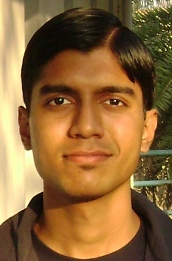 |
STAGES PER STUDENTI DI SCUOLA SECONDARIA STAGES INVERNALI 2010 |
 |
| SOMNATH CHOUDHURY |  |
||
| CEA Saclay, France | |||
Q: Please send us a short presentation of you including, if possible, a picture. I come from the city of Kolkata (previously known as Calcutta) in India and I started my physics studies at the University of Calcutta and then at Indian Institute of Technology – Kharagpur, after which I debuted my research career at LNF in Italy on the SIDDHARTA experiment and also adding to the fact that I am a collaborator to the new AMADEUS experiment which would look for deeply-bound kaonic nuclear clusters. Then I moved to Indiana University Cyclotron Facility to work on the STAR experiment at Brookhaven National Laboratory in the United States and now I work at CEA Saclay in France on the CMS experiment at the LHC at CERN welcoming new physics at this new energy scale. Q: What are you working at now and what are your ambitions or expectations? Q: How and for what reason was your interest for physics born? Which characters have influenced this choice? What is the most beautiful memory of your life as a student? It started from my high school days when I realized that physics is a subject to understand and is very fundamental in nature and does not give you nightmares having to memorize stuff. My parents had provided me full support to pursue a career in physics and I got motivated towards nuclear and particle physics. When I look back into my student days, I find that the life in itself was so beautiful. Q: Which difficulties did you have to deal with in your career? What has given you the strength to carry on? Which was the most significant event of your career? Coming across difficult personalities becomes the difficult point of life. But then one has to be clam and composed in life and this along with my motivation to do the physics gave me the strength to carry on. The subject in itself is so motivating that I shed off any difficult memories that passed by my career. Q: Which do you believe will be the next discovery in physics, and how this might contribute in changing our lives? Q: In your opinion, what has been the biggest discovery in physics and who has been your "reference-scientist"? To me the greatest ever discovery in physics is gravity and Newton is my reference scientist. Q: What characterizes research workplace and how is scientific collaboration organized? A research workplace should be characterized by a healthy coordination between the members accompanied by the exchange of views and ideas on research and at the same time bear a friendly and cheerful atmosphere. One should not think of personal gains when working in a scientific collaboration, but in fact think about the group as a whole and make efforts to propagate in that direction. Q: Considering the crisis of inscriptions in scientific faculties, which do you retain are the reasons of the gap between young people and scientific studies and what may the world of research do in order to change this trend? If one finds young people not pursuing science, the major factors to this are the quick and easy financial success in other areas. But then I would say to the young people that this quick success might not be an ever-lasting success and would not have the same satisfaction within you if you have done something significant in science. Young people should come forward with the goal and passion of directly contributing to the advancement of frontier areas of physics as well as the overall body of knowledge discovered by man. But then I feel that to attract young minds, the world of research could offer attractive salaries and performance based incentives to the scientists. Q: How can a scientist be defined and how do talent, intuition and study influence his profession? Q: How do you spend your free time? I spend my leisure hours having fun and enjoyment with family and friends relaxing as much as possible, listening to music and watching movies and also reading novels and short stories at times. Q: In this period of economic crisis, how do you see the future of research and what do you think about the employment of nuclear energy for energetic aims?
|
|||